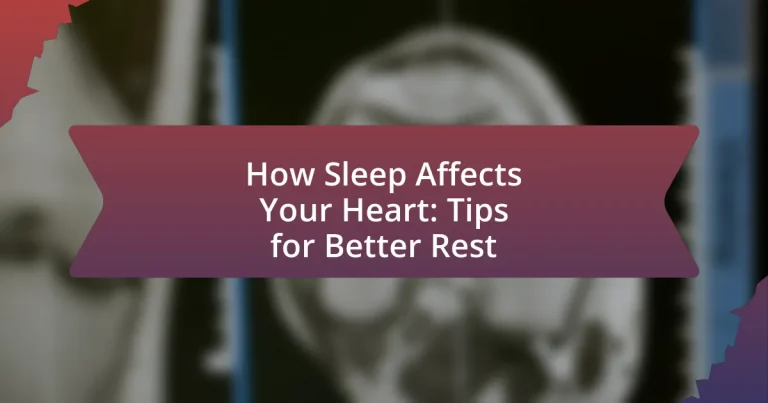The article focuses on the critical relationship between sleep and heart health, emphasizing how adequate sleep regulates blood pressure and reduces the risk of cardiovascular diseases. It outlines the physiological effects of sleep on heart rate and blood pressure, highlighting the dangers of sleep deprivation, including increased risks of hypertension, heart disease, and stroke. The article also discusses the importance of sleep quality, the impact of sleep disorders like sleep apnea and insomnia on cardiovascular health, and practical strategies for improving sleep hygiene to enhance heart health. Additionally, it explores the role of lifestyle changes, dietary adjustments, and technology in promoting better sleep and, consequently, better heart health.

How does sleep impact heart health?
Sleep significantly impacts heart health by regulating blood pressure and reducing the risk of cardiovascular diseases. Adequate sleep helps maintain a healthy balance of hormones that control stress and inflammation, both of which are critical for heart function. Research indicates that individuals who consistently get less than seven hours of sleep per night have a higher risk of developing heart disease, hypertension, and stroke. For instance, a study published in the Journal of the American College of Cardiology found that short sleep duration is associated with an increased risk of coronary artery disease. Thus, prioritizing sufficient sleep is essential for maintaining optimal heart health.
What are the physiological effects of sleep on the heart?
Sleep has significant physiological effects on the heart, primarily by regulating heart rate and blood pressure. During sleep, the body enters a state of reduced sympathetic nervous system activity, leading to lower heart rates and decreased blood pressure, which allows the heart to recover and repair itself. Research indicates that adequate sleep duration, typically 7-9 hours per night, is associated with a lower risk of cardiovascular diseases, including hypertension and heart attacks. For instance, a study published in the Journal of the American College of Cardiology found that individuals who consistently sleep less than 6 hours per night have a higher incidence of coronary artery disease. Thus, sleep plays a crucial role in maintaining cardiovascular health by promoting restorative processes that benefit heart function.
How does sleep duration influence heart rate and blood pressure?
Sleep duration significantly influences heart rate and blood pressure, with insufficient sleep leading to increased heart rate and elevated blood pressure levels. Research indicates that adults who consistently sleep less than seven hours per night are at a higher risk for hypertension and cardiovascular issues. A study published in the Journal of Clinical Hypertension found that individuals with shorter sleep durations exhibited higher systolic and diastolic blood pressure readings compared to those who slept adequately. Additionally, the American Heart Association highlights that poor sleep quality and duration can disrupt the autonomic nervous system, resulting in increased heart rate variability and stress on the cardiovascular system.
What role does sleep quality play in cardiovascular health?
Sleep quality significantly impacts cardiovascular health by influencing factors such as blood pressure, inflammation, and heart rate variability. Poor sleep quality has been linked to an increased risk of hypertension, heart disease, and stroke, as evidenced by a study published in the Journal of the American College of Cardiology, which found that individuals with sleep disturbances had a 45% higher risk of developing cardiovascular issues. Additionally, sleep deprivation can lead to elevated levels of stress hormones, which further strain the cardiovascular system. Thus, maintaining good sleep quality is essential for promoting heart health and reducing the risk of cardiovascular diseases.
Why is sleep important for preventing heart disease?
Sleep is crucial for preventing heart disease because it helps regulate various physiological processes that maintain cardiovascular health. Adequate sleep lowers blood pressure, reduces inflammation, and improves insulin sensitivity, all of which are risk factors for heart disease. Research published in the Journal of the American College of Cardiology indicates that individuals who consistently get less than seven hours of sleep per night have a higher risk of developing heart disease compared to those who sleep adequately. Furthermore, sleep deprivation can lead to increased stress hormones, which can negatively impact heart health.
How does sleep deprivation contribute to heart-related issues?
Sleep deprivation significantly increases the risk of heart-related issues by contributing to hypertension, inflammation, and metabolic disturbances. Research indicates that individuals who consistently sleep less than seven hours per night are at a higher risk of developing cardiovascular diseases. A study published in the European Heart Journal found that insufficient sleep is associated with a 48% increased risk of coronary heart disease and a 15% increased risk of stroke. Additionally, sleep deprivation can lead to elevated cortisol levels, which may cause increased blood pressure and heart rate, further straining the cardiovascular system.
What are the long-term effects of poor sleep on heart health?
Poor sleep significantly increases the risk of cardiovascular diseases, including hypertension, heart attack, and stroke. Research indicates that individuals who consistently get less than seven hours of sleep per night are more likely to develop these conditions due to factors such as increased inflammation, elevated stress hormones, and disrupted metabolic processes. A study published in the Journal of the American College of Cardiology found that poor sleep quality is associated with a 45% higher risk of developing heart disease. Additionally, chronic sleep deprivation can lead to obesity and diabetes, both of which are major risk factors for heart health.

What are the signs of sleep-related heart problems?
Signs of sleep-related heart problems include excessive daytime sleepiness, snoring, and irregular breathing patterns during sleep. These symptoms may indicate conditions such as sleep apnea, which is linked to increased risk of hypertension and cardiovascular disease. Research shows that individuals with untreated sleep apnea have a higher likelihood of developing heart problems, as the condition can lead to oxygen deprivation and increased strain on the heart.
How can you identify sleep disorders that affect heart health?
To identify sleep disorders that affect heart health, one should monitor symptoms such as excessive daytime sleepiness, loud snoring, and episodes of breathing cessation during sleep, which are indicative of conditions like sleep apnea. Research indicates that sleep apnea is linked to increased risks of hypertension, heart disease, and stroke, as it disrupts normal sleep patterns and oxygen levels. Additionally, conducting a sleep study, or polysomnography, can provide concrete evidence of sleep disturbances and their impact on cardiovascular health.
What symptoms indicate a potential sleep disorder?
Common symptoms indicating a potential sleep disorder include persistent insomnia, excessive daytime sleepiness, loud snoring, and episodes of breathing cessation during sleep. Insomnia affects approximately 30% of adults, leading to difficulties in falling or staying asleep, which can significantly impact overall health. Excessive daytime sleepiness may suggest conditions like sleep apnea, where disrupted breathing during sleep leads to poor sleep quality. Loud snoring is often associated with obstructive sleep apnea, affecting about 25% of adults, and can indicate airway obstruction. Episodes of breathing cessation, known as apneas, are critical symptoms that require medical evaluation, as they can lead to cardiovascular issues.
How do sleep apnea and insomnia relate to heart conditions?
Sleep apnea and insomnia are both linked to an increased risk of heart conditions. Sleep apnea causes repeated interruptions in breathing during sleep, leading to lower oxygen levels and increased blood pressure, which can strain the heart. Studies indicate that individuals with sleep apnea are more likely to develop hypertension, heart failure, and arrhythmias. Insomnia, characterized by difficulty falling or staying asleep, can also contribute to cardiovascular issues by increasing stress hormones and inflammation, which negatively impact heart health. Research published in the Journal of Clinical Sleep Medicine found that chronic insomnia is associated with a higher incidence of coronary heart disease.
What tests can diagnose sleep-related heart issues?
Polysomnography is the primary test used to diagnose sleep-related heart issues. This comprehensive sleep study records brain waves, oxygen levels, heart rate, and breathing, providing detailed insights into sleep patterns and potential cardiovascular problems. Additionally, an electrocardiogram (ECG) can be utilized to monitor heart activity during sleep, identifying arrhythmias or other heart conditions that may be exacerbated by sleep disorders. These tests are essential for understanding the relationship between sleep disturbances and heart health, as evidenced by studies linking obstructive sleep apnea to increased cardiovascular risk.
What role do sleep studies play in assessing heart health?
Sleep studies play a crucial role in assessing heart health by identifying sleep disorders that can negatively impact cardiovascular function. These studies, such as polysomnography, monitor various physiological parameters during sleep, including heart rate, oxygen levels, and sleep stages. Research indicates that conditions like obstructive sleep apnea, which can be diagnosed through sleep studies, are linked to increased risks of hypertension, heart attack, and stroke. For instance, a study published in the American Journal of Respiratory and Critical Care Medicine found that untreated sleep apnea significantly raises the risk of cardiovascular disease. Thus, sleep studies are essential for diagnosing sleep-related issues that may contribute to heart health problems.
How can wearable technology help monitor sleep and heart health?
Wearable technology can help monitor sleep and heart health by providing real-time data on heart rate, sleep patterns, and overall activity levels. Devices such as smartwatches and fitness trackers utilize sensors to track heart rate variability, sleep stages, and duration, allowing users to gain insights into their cardiovascular health and sleep quality. For instance, a study published in the Journal of Clinical Sleep Medicine found that wearable devices can accurately assess sleep duration and efficiency, which are critical for heart health. By analyzing this data, users can make informed lifestyle changes to improve both their sleep and heart health, thereby reducing the risk of cardiovascular diseases.

What strategies can improve sleep for better heart health?
To improve sleep for better heart health, individuals should establish a consistent sleep schedule, create a restful environment, and limit screen time before bed. Consistent sleep schedules help regulate the body’s internal clock, promoting deeper sleep, which is essential for cardiovascular health. A restful environment, characterized by a cool, dark, and quiet space, enhances sleep quality, reducing stress and improving heart function. Limiting screen time before bed decreases exposure to blue light, which can disrupt melatonin production and negatively impact sleep quality. Research indicates that poor sleep is linked to increased risks of heart disease, emphasizing the importance of these strategies for maintaining heart health.
How can lifestyle changes enhance sleep quality?
Lifestyle changes can enhance sleep quality by promoting healthier sleep patterns and reducing factors that disrupt rest. Regular physical activity, for instance, has been shown to improve sleep duration and quality, as evidenced by a study published in the Journal of Clinical Sleep Medicine, which found that individuals who engage in moderate exercise report better sleep quality. Additionally, maintaining a consistent sleep schedule helps regulate the body’s internal clock, leading to improved sleep efficiency. Reducing caffeine and alcohol intake, particularly in the hours leading up to bedtime, can also significantly decrease sleep disturbances, as these substances are known to interfere with the ability to fall and stay asleep. Furthermore, creating a relaxing bedtime routine can signal the body that it is time to wind down, enhancing the overall sleep experience.
What dietary adjustments promote better sleep?
Dietary adjustments that promote better sleep include reducing caffeine and alcohol intake, increasing the consumption of magnesium-rich foods, and incorporating foods high in tryptophan. Caffeine, found in coffee and certain teas, can disrupt sleep patterns, so limiting its consumption, especially in the afternoon and evening, is crucial. Alcohol may initially induce sleep but can lead to fragmented sleep later in the night, making moderation important. Foods rich in magnesium, such as leafy greens, nuts, and seeds, help regulate sleep by promoting relaxation. Additionally, tryptophan-rich foods like turkey, dairy, and bananas can enhance the production of serotonin and melatonin, hormones that regulate sleep cycles. These dietary changes are supported by research indicating that nutrition plays a significant role in sleep quality and overall health.
How does exercise influence sleep and heart health?
Exercise significantly improves sleep quality and enhances heart health. Regular physical activity helps regulate sleep patterns by promoting deeper sleep and reducing insomnia symptoms. Studies indicate that individuals who engage in moderate aerobic exercise, such as walking or cycling, experience better sleep quality and duration. Furthermore, exercise strengthens the cardiovascular system by lowering blood pressure, improving cholesterol levels, and enhancing overall heart function. Research published in the Journal of Clinical Sleep Medicine shows that individuals who exercise regularly have a lower risk of developing heart disease, highlighting the interconnected benefits of physical activity on both sleep and cardiovascular health.
What sleep hygiene practices should be adopted?
To improve sleep quality and overall heart health, individuals should adopt several key sleep hygiene practices. These practices include maintaining a consistent sleep schedule by going to bed and waking up at the same time every day, creating a comfortable sleep environment that is dark, quiet, and cool, and limiting exposure to screens and blue light at least an hour before bedtime. Research indicates that a consistent sleep schedule can enhance sleep quality and duration, which is crucial for cardiovascular health. Additionally, studies show that a conducive sleep environment can significantly reduce sleep disturbances, leading to better restorative sleep.
How can a consistent sleep schedule benefit heart health?
A consistent sleep schedule can significantly benefit heart health by regulating the body’s circadian rhythms, which in turn helps maintain optimal cardiovascular function. Research indicates that irregular sleep patterns are associated with increased risks of hypertension, heart disease, and stroke. For instance, a study published in the Journal of the American College of Cardiology found that individuals with irregular sleep schedules had a 1.5 times higher risk of developing cardiovascular issues compared to those with consistent sleep patterns. This regulation of sleep promotes better blood pressure control and reduces inflammation, both of which are crucial for maintaining heart health.
What environmental factors should be optimized for better sleep?
To achieve better sleep, it is essential to optimize environmental factors such as light, noise, temperature, and bedding. Research indicates that a dark environment promotes melatonin production, which is crucial for sleep onset; therefore, using blackout curtains can significantly enhance sleep quality. Additionally, maintaining a cool room temperature, ideally between 60 to 67 degrees Fahrenheit, has been shown to facilitate deeper sleep cycles. Noise reduction is also vital; studies reveal that exposure to disruptive sounds can lead to fragmented sleep, so utilizing white noise machines or earplugs can be beneficial. Lastly, investing in a comfortable mattress and pillows tailored to individual preferences can improve sleep posture and overall comfort, contributing to a more restful night.
What are practical tips for achieving better sleep?
To achieve better sleep, establish a consistent sleep schedule by going to bed and waking up at the same time every day. This practice regulates the body’s internal clock, improving sleep quality. Research indicates that maintaining a regular sleep pattern can enhance overall sleep efficiency and reduce insomnia symptoms. Additionally, creating a comfortable sleep environment—such as a dark, quiet, and cool room—can significantly contribute to better sleep. Studies show that optimal sleep conditions lead to deeper and more restorative sleep cycles. Limiting exposure to screens before bedtime is also crucial, as blue light can interfere with melatonin production, making it harder to fall asleep.
How can relaxation techniques improve sleep quality?
Relaxation techniques can significantly improve sleep quality by reducing stress and promoting a state of calmness. When individuals engage in practices such as deep breathing, meditation, or progressive muscle relaxation, they activate the body’s relaxation response, which lowers heart rate and decreases levels of stress hormones like cortisol. Research indicates that individuals who practice relaxation techniques before bedtime experience longer sleep duration and improved sleep efficiency. For instance, a study published in the Journal of Clinical Psychology found that mindfulness meditation can enhance sleep quality and reduce insomnia symptoms in adults.
What role does technology play in enhancing sleep hygiene?
Technology plays a significant role in enhancing sleep hygiene by providing tools and applications that promote better sleep practices. Sleep tracking devices, such as smartwatches and apps, monitor sleep patterns and offer insights into sleep quality, helping individuals identify factors that may disrupt their rest. For instance, a study published in the Journal of Clinical Sleep Medicine found that individuals using sleep-tracking technology improved their sleep duration and quality by making informed adjustments based on the data collected. Additionally, blue light filters on devices reduce exposure to disruptive light before bedtime, further supporting healthier sleep habits.





